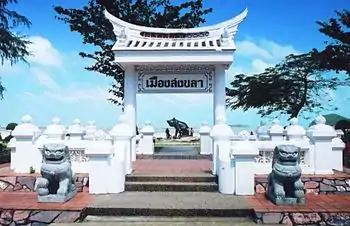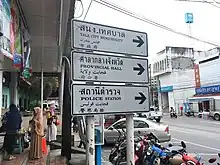The Southern Gulf Coast is a region in Southern Thailand that includes the provinces of Songkhla and Phatthalung, and the three deep southern provinces of Pattani, Narathiwat, and Yala. The region of the deep southern provinces is also sometimes called Patani (with one t, as opposed to the province and city which are usually spelled with two t's), a name which echoes the name of the former Kingdom of Patani which encompassed the region. This is the only region in Thailand with a Muslim majority. The deep south is sometimes also said to include the province of Satun, but this guide uses a slightly more limited definition.
Cities
- 🌍 Hat Yai — the largest city of the south
- 🌍 Narathiwat — a fishing town with nice beaches
- 🌍 Pattani — ancient capital of the Kingdom of Patani
- 🌍 Phatthalung — a mountainous city, one of the ancient cities of the south
- 🌍 Songkhla — the great city on two seas offers some great beaches
- 🌍 Sungai Kolok — border town, close to Rantau Panjang in Malaysia
- 🌍 Yala — the largest city in the deep south
Other destinations
- 🌍 Betong — town on the border with Malaysia, on the road from Yala
- 🌍 Padang Besar — border crossing with Malaysia by railway
- 🌍 Sadao — border crossing with Malaysia
- 🌍 Sathing Phra — wildlife refuge near Songkhla
- 🌍 Tak Bai — border town in Narathiwat Province, close to Kota Bahru in Malaysia
- 🌍 Thepha — small beach village at the border with Malaysia
Understand
|
Ramadan Ramadan is the 9th and holiest month in the Islamic calendar and lasts 29–30 days. Muslims fast every day for its duration and most restaurants will be closed until the fast breaks at dusk. Nothing (including water and cigarettes) is supposed to pass through the lips from dawn to sunset. Non-Muslims are exempt from this, but should still refrain from eating or drinking in public as this is considered very impolite. Working hours are decreased as well in the corporate world. Exact dates of Ramadan depend on local astronomical observations and may vary somewhat from country to country. Ramadan concludes with the festival of Eid al-Fitr, which may last several days, usually three in most countries.
If you're planning to travel to Southern Gulf Coast during Ramadan, consider reading Travelling during Ramadan. |
.jpg.webp)
This region attracts tourists for its beautiful nature, historic locations, and traditional culture related to the unique blend of Thai-Buddhist, Malay-Muslim, and Chinese culture in the region. The majority of the population are Muslims, many of whom speak a dialect of the Malay language called Yawi.
The sultans of this area traditionally paid tribute to the distant King in Bangkok, and in return were left alone. in 1909, the area was officially recognised as Thai territory. In 1944, a policy of enforced Thai values and language began. Traditional Muslim courts were dismantled and Thai instruction was instituted in schools, much to the dislike of the indigenous Muslim population. In 1947, simmering ethnic and religious tensions exploded into the South Thailand Insurgency, which continues to the present day. Violence was most intense between 2004-2015 with attacks on the army, police and civilians from a patchwork of rebel movements. This was met with brutal repression from the state, often exascerbating the cycle of violence. In this period alone, it is estimated that 6,500 people died and 12,000 were injured due to the actions of both parties. However, as of 2022, this insurgency has largely died down and tourists are no longer in any danger, despite the region still being subject to rule by Emergency Decree.
Talk

The three deep southern provinces are a multilingual region. Thai is the main language of public life, used in administration, commerce and education. A large part of the population, however, speak a dialect of Malay as their mother tongue. This dialect is often called Yawi, after the Arabic script it is written with. The Malay language was previously only written with this script but both Malaysia and Indonesia have since switched to the Latin alphabet and Yawi (or Jawi) script is no longer widely used outside of southern Thailand (except in the highly religious neighboring Malaysian state of Kelantan and the Sultanate of Brunei).
The Yawi dialect is very difficult for speakers of standard Malay (Malaysian or Indonesian) to understand. Similarly the local dialect of Thai is quite distinct from Thai as spoken in Bangkok, although the difference is not as great. Chinese is also spoken by the Chinese minority.
Because of its dominance in the public sphere, many young Malays are more fluent in Thai than they are in Malay (especially in the cities). A Thai speaker should have no problems communicating with anybody from the deep south. Those who speak neither Malay nor Thai may run into some problems as English is not well understood. Most people know some words, though, and the children study English in school. With a good sense of humour, patience, and some imagination communication should work out though, and quite often an English speaker will be found nearby more than willing to show off some of his or her skills.
Get in
As of October 2022, Hat Yai airport has multiple flights per day from Bangkok (both airports) as well as less frequent flights from Ko Samui, Phuket, Chiang Mai, Udon Thani, Khon Kaen, Kuala Lumpur and Singapore. Betong airport is new and only has two flights per week from Bangkok, at four times the price of a flight to Hat Yai.
The Thai train system serves Phattalung city, Hat Yai, Yala city, Pattani city and the border crossings of Sungai Kolok and Padang Besar. If you're heading south to this area, sleeper services on this line represent good value, comfort and convenience for less than the price of an air fare.
If heading north into Thailand, you can take a bus to Sungai Kolok or a train to Padang Besar and continue north into Thailand by train.
Get around

The Southern Train Line connects (from south to north) Sunga Kolok, Yala, Pattani and Hat Yai with points north. There is also a branch line from Hat Yai to Padang Besar. These train services are suitable for travelling between towns in the Southern Gulf Coast. These regular services are cheap and comfortable enough for short trips. For example, the trip by ordinary train from Sungai Kolok to Yala town takes 2 hours and costs THB 100. Travelling by train has the added benefit that train stations are usually in the centre of town, so you are less likely to need a taxi to get you to your accommodation.
There are frequent and cheap buses between the main cities in the three southernmost provinces. Red buses go between Yala and Pattani, leaving around the corner from the bus station in Yala and from Ruedi Rd in Pattani, and blue buses between Pattani and Narathiwat. These buses leave about once or twice an hour. For travel between the smaller towns and villages, songthaews are the main means of transportation.
Long-distance buses passing through the region can be taken between the main towns. They are a much more comfortable mode of transportation, but more expensive and much less frequent. The long-distance buses all go through bus stations just outside the towns they serve.
The road system in the deep south is generally quite good, driving on your own can be an option if you feel up for it. Taxis can also be booked to take you between destinations. Travelling between any two places in deep southern Thailand generally involves going through a lot of army roadblocks. This is due to the security situation. Usually there won't be much hassle if you're a tourist, but these can significantly slow a journey down. As of 2022, tourists report most roadblocks not requiring vehicles to stop. When stops occur, they are brief and friendly.
See
Do
Eat
Drink
Although Pattani, Narathiwat and Yala are Muslim-majority provinces, alcohol is still available at hotels, grocery stores and 7-elevens. Do not drink alcohol in public.
Stay safe
| Note: Travelling to Narathiwat, Pattani, Songkhla and Yala provinces can be dangerous due to an insurgency between Malay separatists and the Thai armed/paramilitary forces and police. The Government of Canada advises against all travel there, whereas the UK Foreign Office advises against all but essential travel. | |
| (Information last updated 03 Sep 2020) |
As the Southern Thailand Insurgency is still ongoing, and the area is still under a state of emergency, many governments and organisations warn against non-essential travel to this region. However, as the cycle of violence continues to wane, peace is returning to the area, and things will appear quite normal to tourists. Tourists are not in any greater danger in this area than they are anywhere else.